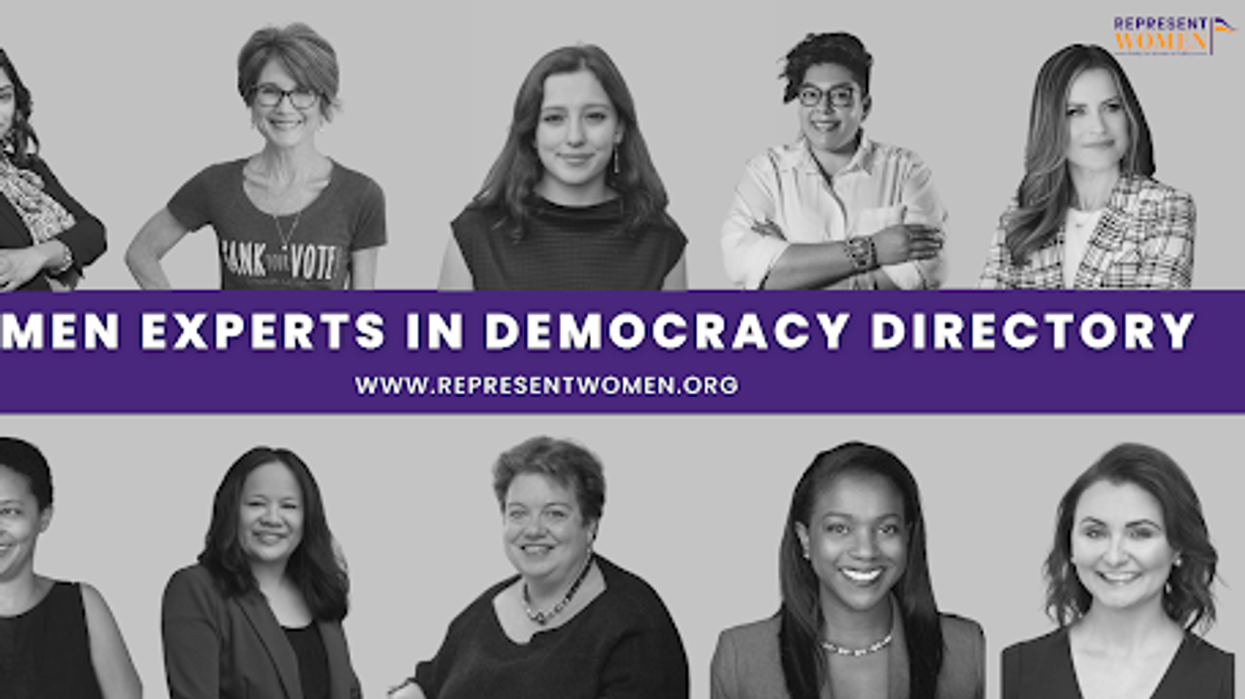Shaw is the outreach manager for RepresentWomen.
We have more women serving as elected officials in the United States than ever before, which is a noteworthy achievement. Getting more women into politics, though, is only the first step.
Simply having more women in these spaces does not always mean we’re being welcomed with open arms. Since women are still underrepresented in most political spaces, we have to navigate them carefully, strategically and oftentimes alone. RepresentWomen’s new resource, the Women Experts in Democracy Directory, is here to help bring more women to the table.
When Johana Bencomo was first elected to the Las Cruces City Council in 2020 and sat on the Utilities Board, she was the only woman, with the rest of her colleagues being almost all white men. For two years, she was the only woman on the board. When we spoke with Bencomo about that time, she explained how she felt like an outsider:
“Being the only one of anything is heavy, you feel pressure and out of place. ... When I'm in those spaces, I think, 'How is no one saying it's only men or only white people? And why does no one notice that something is off?'”
From not being taken seriously to not getting votes for leadership positions within the board, the impact of being the only woman in the room was undoubtedly felt.
This is what it’s like for a vast majority of women, from elected officials to scholars to grassroots activists. The prevalence of all-male spaces and panels sends a message, intentional or not, that women are not experts and that there are no women qualified to speak on a given topic.
Excluding women from the table (or the podium) also means that it’s much more likely the conversation is one-dimensional. This severely limits the depth and breadth of the knowledge that can be gained. To make matters worse, women are then also unable to elevate themselves in their careers as they are not being given the same exposure or opportunities as their male colleagues.
As a woman working in democracy reform for over 30 years, RepresentWomen founder and Executive Director Cynthia Richie Terrell knows this reality too well. That’s why RepresentWomen set out to uplift women experts in democracy, starting with our very own convening, the Democracy Solutions Summit. This annual event features over 40 women experts speaking on various topics, including better ballot access, electoral reform and fair representation. After the inaugural summit in 2022, we received numerous messages from people surprised at how many women experts in democracy reform there are.
While our summit sought to be one solution to all-male panels, it reminded us that oftentimes, in this space, people want to include more women in conversations around reform but don't know where to start. The feedback we received after the summit sparked a drive to go even further than just hosting our own all-women panels.
Thus, the Women Experts in Democracy Directory was born. The goal of this directory is to make it easier to include women on panels and at conferences, to speak at events, to contribute to research projects, and so much more. As Tyler Fisher, Unite America’s senior director of policy and partnerships, said, “The Women Experts in Democracy Directory should be a bookmarked resource by any leader of any serious election reform campaign. Thanks to RepresentWomen's work, there is no longer an excuse for not having female representation on our boards, panels, or committees.”
Our directory is a publicly available resource that includes women like Bencomo, along with Danielle Allen, former director of the Edmond J. Safra Center for Ethics at Harvard University; North Carolina Supreme Court Associate Justice Anita Earls; OpenSecrets Executive Director Sheila Krumholz; national elections expert Amber McReynolds; Ann Ravel, formerly a commissioner on the Federal Elections Commission; and many more. With over 80 women and counting, this directory allows you to refine your search based on area of expertise, occupation, geographic location and languages spoken. And, of course, it wouldn’t be complete without the ways you can connect with these incredible experts.
The directory is ever-growing, so if there is a woman-identifying expert you think should be included in this directory, fill out this form.
As a community, it’s pivotal that we commit to increasing diversity and prioritizing inclusion in every aspect of our work, and this directory helps us do this. In the insightful words of Bencomo, “In order to change the system, we need people who are directly impacted in every space. We need these people to shake things up and bring better, bolder solutions to the table.”



















